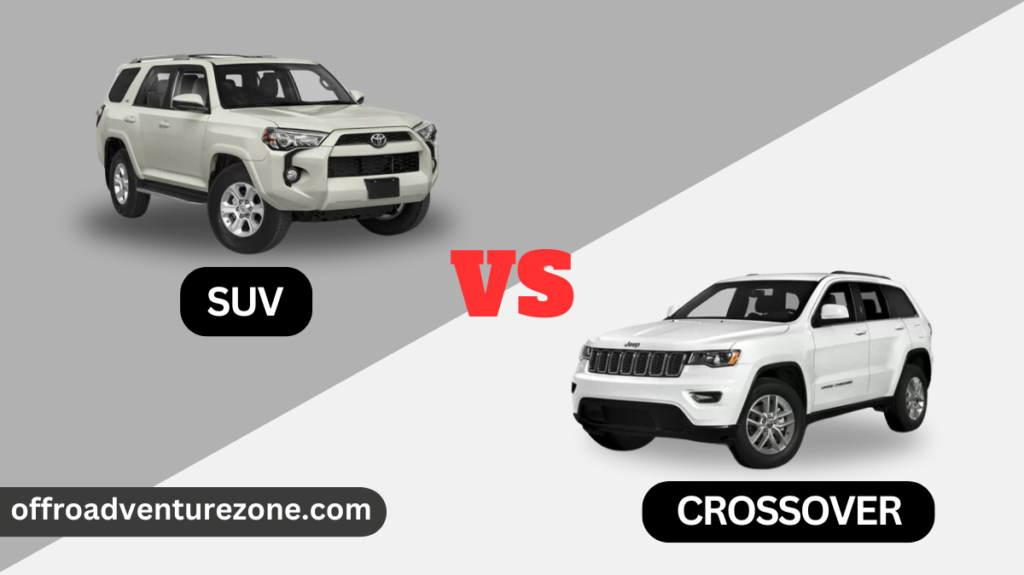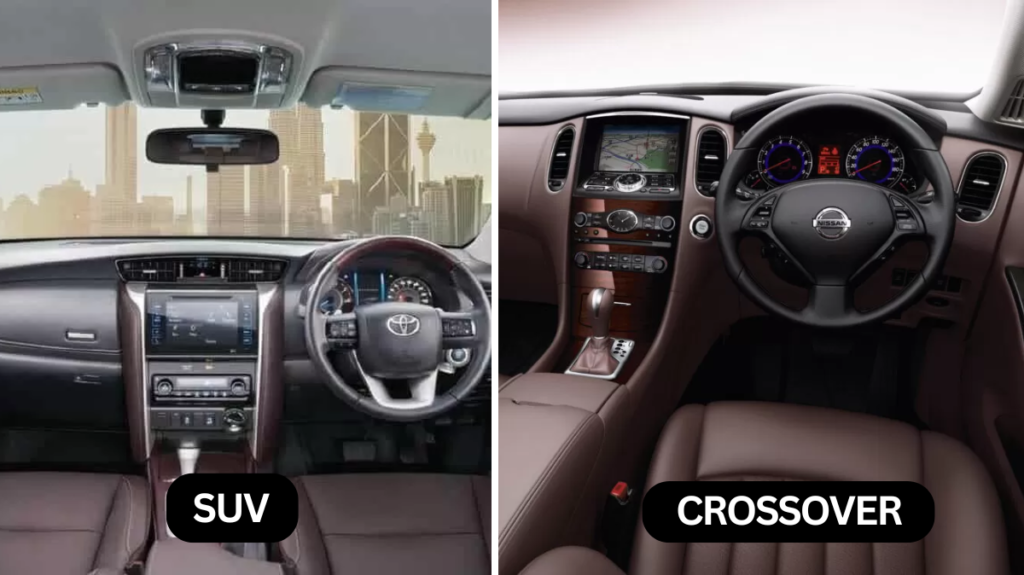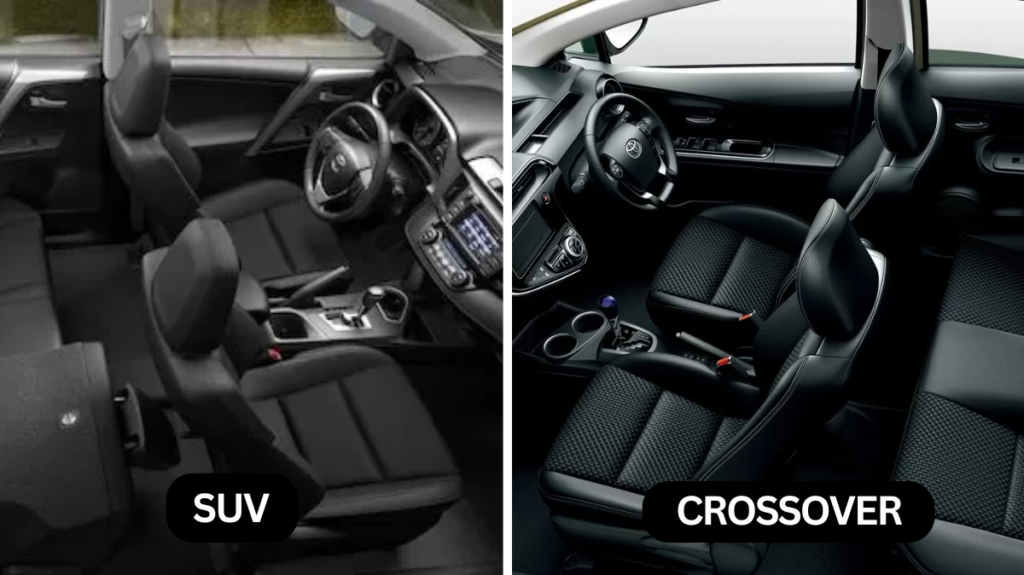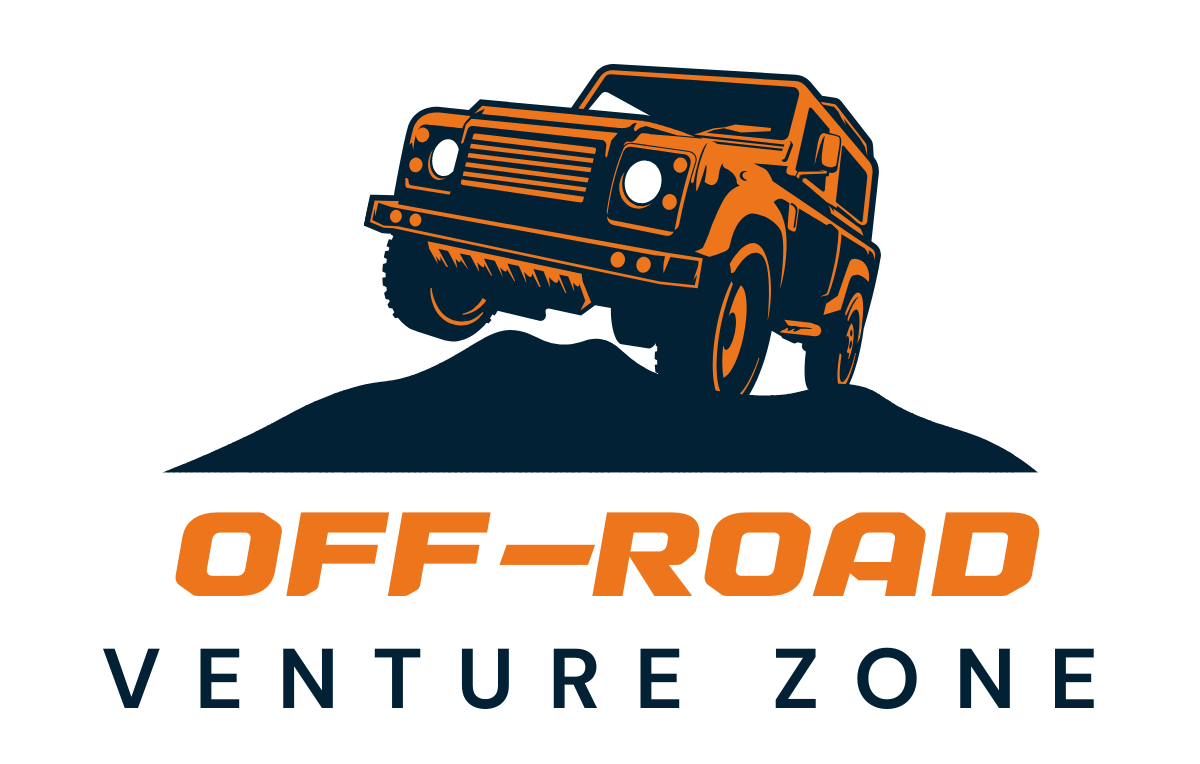Choosing a new car can be a fun but tricky decision. If you’re thinking about getting a car, you might have heard about SUVs and crossovers. These two types of cars might look similar, but they have some important differences.
We will talk about the differences between an SUV and a crossover. We will look at things like performance, comfort, safety, fuel efficiency, and more.

Contents
- 1 SUV vs Crossover Vehicle
- 2 What is an SUV?
- 3 What is a Crossover?
- 4 Terrain and Performance
- 5 Comfort and Ride Quality
- 6 Fuel Efficiency
- 7 Safety
- 8 Practicality & Versatility
- 9 Durability and Longevity
- 10 Overall Usage
- 11 Driving Experience for Beginners
- 12 Resale Value
- 13 Technology Features
- 14 User Reviews with Ratings and Costs
- 15 Conclusion
SUV vs Crossover Vehicle
The main difference between SUVs and crossovers is their construction. SUVs are built on truck platforms with body-on-frame design, making them tougher and better for off-road use. Crossovers use car platforms with unibody construction, offering a smoother ride and better fuel economy for everyday driving.
Now, let’s create a detailed comparison table for SUV vs Crossover Vehicle:
| Feature | SUV | Crossover |
| Build Type | Truck-based body-on-frame | Car-based unibody |
| Size | Usually bigger and taller | Smaller and lower |
| Fuel Use | Uses more gas | Better gas mileage |
| Ride Comfort | Slightly bumpy ride | Smoother, car-like ride |
| Off-road ability | Great for rough roads | Better for city roads |
| Cargo Space | More room for bags | Less space than SUVs |
| Towing Power | Can pull heavy loads | Less pulling power |
| Price | Often costs more | Usually costs less |
Summary: Think of SUVs as tough trucks that can handle rough roads and pull heavy things, while crossovers are more like big cars that are easier to drive in the city. If you want comfort and good gas mileage, pick a crossover. If you need power and space, go for an SUV.
What is an SUV?
An SUV stands for Sport Utility Vehicle. It is a type of car that is bigger and more powerful. SUVs are built to handle tough roads, like dirt or rocky trails.
They are perfect for people who want to go on adventures or need a lot of space. Many SUVs have 4-wheel drive (4WD) or all-wheel drive (AWD), which helps them drive on rough terrain like snow, mud, or sand.
What is a Crossover?
A crossover is a smaller car that has some features of an SUV. Crossovers are built on a regular car’s frame, so they are lighter and easier to drive.
They offer plenty of space for passengers and cargo, just like SUVs, but they are not as powerful or built for tough roads. Crossovers are best for people who drive on smooth streets and want something that’s easier to handle.
Terrain and Performance
The way a car performs on different types of roads is very important when choosing between an SUV and a crossover.
SUV Performance
SUVs are great for rough roads like dirt trails, muddy paths, or snow. Their larger size and strong engines help them go through tough conditions. If you like hiking, camping, or going on off-road trips, an SUV might be the better choice for you.
Crossover Performance
Crossovers are better for smooth roads. They are smaller and lighter, which makes them easier to drive in the city. Crossovers are good for people who mostly drive on paved roads, like highways or city streets. If you don’t plan to drive on rough paths, a crossover is a great option.
Comfort and Ride Quality
Comfort is important for everyone who spends a lot of time in their car. Let’s see how SUVs and crossovers compare when it comes to comfort.
SUV Comfort
SUVs are often very comfortable for long trips. They have more space inside, and their larger size gives you a smooth ride on rough roads. But sometimes, SUVs can feel bumpy on highways or smooth roads because of their size.
Crossover Comfort
Crossovers are smaller and lighter, so they feel smoother when driving on smooth roads. They are easy to handle and can be very comfortable for everyday driving. If you mostly drive around the city or take shorter trips, a crossover might be the most comfortable option for you.
Fuel Efficiency
Everyone likes to save money on gas. Let’s look at how SUVs and crossovers compare when it comes to fuel efficiency.
SUV Fuel Efficiency
SUVs usually use more fuel because they are larger and have bigger engines. This means you might have to stop for gas more often. However, newer SUVs are being made with better engines that save more fuel. Some SUVs also come in hybrid versions, which use less gas.
Crossover Fuel Efficiency
Crossovers are more fuel-efficient than SUVs. Since they are smaller and lighter, they don’t need as much gas. If you want to save money on fuel and avoid going to the gas station often, a crossover is the better choice.
| Vehicle Type | Average Miles Per Gallon (MPG) | Examples |
| SUV | 15-25 | Jeep Wrangler, Toyota Land Cruiser |
| Crossover | 25-35 | Honda CR-V, Toyota RAV4 |
Safety
No one wants to drive an unsafe car. Let’s look at how SUVs and crossovers compare in terms of safety.
SUV Safety
SUVs are bigger and can offer more protection in some situations, like in a crash. They have a strong frame and are more likely to protect passengers in case of an accident. However, some SUVs can be more likely to roll over if you take a sharp turn or drive too fast.
Crossover Safety
Crossovers are lighter than SUVs, which means they are less likely to roll over. They are also very safe and come with features like automatic brakes and cameras to help you park. Crossovers are great for new drivers because they are easier to control.

Practicality & Versatility
When it comes to practicality, both SUVs and crossovers have their strengths. Let’s see which one works best for everyday use.
SUV Practicality
SUVs are great for families who need a lot of space. They can carry a lot of luggage or gear, and many SUVs can tow things like trailers or boats.
If you like to go on camping trips or need space for a lot of stuff, an SUV is a great choice. SUVs are also good if you need to drive on rough roads or in bad weather.
Crossover Practicality
Crossovers are more compact and easier to park in crowded places. They have enough space for most families, but they don’t take up as much room as an SUV.
Crossovers are perfect if you live in the city and need something that’s easy to drive and park. They are also great for road trips because they have enough space for luggage.
| Feature | SUV | Crossover |
| Seating Capacity | Up to 8 passengers | Up to 5 passengers |
| Cargo Space | Up to 90 cubic feet | Up to 70 cubic feet |
Durability and Longevity
How long will your car last? Let’s compare how durable and long-lasting SUVs and crossovers are.
SUV Durability
SUVs are built to last a long time. They are tough and can handle a lot of wear and tear from off-roading or heavy use. If you take care of your SUV, it should last for many years. However, repairs can be expensive, especially for larger SUVs.
Crossover Durability
Crossovers are also durable and can last for a long time if you take care of them. They might not be as tough as SUVs, but they are easier to repair and maintain. Crossovers are great if you want a vehicle that lasts but isn’t too expensive to fix.
Overall Usage
Think about how often you will use your car and what you need it for.
SUV Overall Usage
SUVs are perfect for people who love adventure. If you go camping, off-roading, or travel to places with bad weather, an SUV can handle it all. SUVs also work well for large families who need a lot of space for people and things.
Crossover Overall Usage
Crossovers are great for people who mainly drive in the city or go on regular road trips. They are easy to park and maneuver in tight spaces, making them perfect for city living. Crossovers are versatile and can handle family trips, daily driving, and some light off-roading.
Driving Experience for Beginners
If you are just starting to drive, you might want to choose a car that is easy to handle.
SUV Driving Experience
SUVs are larger and might be harder to drive for beginners. They take up more space and can be tricky to park. But many SUVs have features like parking sensors and backup cameras that can help new drivers.
Crossover Driving Experience
Crossovers are easier for beginners to drive. They are smaller and lighter, which makes them easier to control. If you’re learning to drive or don’t feel comfortable in a big car, a crossover is a great choice.

Resale Value
It’s important to know how much your car will be worth if you decide to sell it in the future.
SUV Resale Value
SUVs usually keep their value well over time. People love them for their size and ability to handle tough conditions, so they can often be sold for a good price later on.
Crossover Resale Value
Crossovers are also popular and can keep their value, though not always as much as SUVs. They are growing in popularity because they are fuel-efficient and practical. However, they may not hold their value quite as well as SUVs.
| Vehicle Type | Resale Value After 5 Years |
| SUV | 50-60% |
| Crossover | 55-65% |
Technology Features
Cars today come with many cool technology features that can make driving easier and more fun.
SUV Technology Features
SUVs often come with great tech features like touchscreens, navigation systems, and safety technologies like lane departure warning. Many SUVs also have Bluetooth and voice control, making it easier to use your phone while driving.
Crossover Technology Features
Crossovers also have many tech features. They often include infotainment systems, rear-view cameras, and advanced safety features. If you want a car with the latest technology but in a smaller package, a crossover is a good choice.
User Reviews with Ratings and Costs
| Model | Vehicle Type | User Rating | Average Cost ($) |
| Toyota RAV4 | Crossover | ⭐⭐⭐⭐⭐ | 28,000 |
| Honda CR-V | Crossover | ⭐⭐⭐⭐⭐ | 30,000 |
| Ford Explorer | SUV | ⭐⭐⭐⭐⭐ | 36,000 |
| Jeep Grand Cherokee | SUV | ⭐⭐⭐⭐⭐ | 40,000 |
| Subaru Outback | Crossover | ⭐⭐⭐⭐⭐ | 32,000 |
Conclusion
Choosing between an SUV and a crossover depends on your needs. If you want a car that can handle off-roading and needs more space, an SUV might be the best choice for you.
On the other hand, if you need a car for city driving, road trips, and fuel savings, a crossover is a great option. Think about what you need the car for, and you’ll be able to make the right decision!
Which vehicle is better for off-roading?
SUVs are better for off-roading because they have higher ground clearance and more powerful engines.
Are crossovers fuel-efficient?
Yes, crossovers are more fuel-efficient than SUVs because they are smaller and lighter.
Which car is safer?
Both SUVs and crossovers are safe, but SUVs are larger and offer more protection in some crash situations.
Which car costs more?
SUVs are generally more expensive than crossovers, but the cost depends on the brand and features.
